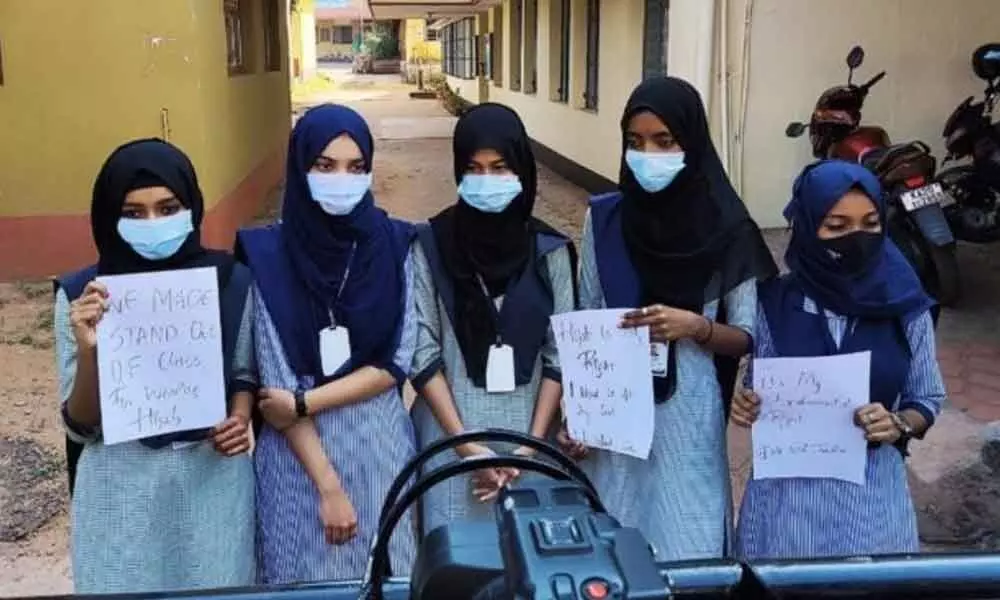Live
- CRDA invites tenders for ‘Happy Nest’ township
- PD Act invoked against red sanders smuggler
- Meghalaya scrape past Goa to secure QF berth
- India lift inaugural U19 Women’s Asia Cup
- No place for Stokes as Root returns to England’s squad for India ODIs and CT
- A year of political earthquake
- Penugonda stresses need for cultural renaissance
- IG inspects police stations at Chirala, Karamchedu
- Sandard Glass raises Rs40 cr in pre-IPO deal
- Options data flags rising volatility
Just In
Wearing hijab not display of religious jingoism: Muslim girls


The Muslim girls who have moved the Karnataka High Court against a ban on Hijab on Tuesday argued that the Indian brand of secularism was a 'positive' one, unlike that of Turkey, and submitted that wearing the headscarf was an innocent practice of faith and not a display of religious jingoism.
Bengaluru: The Muslim girls who have moved the Karnataka High Court against a ban on Hijab on Tuesday argued that the Indian brand of secularism was a 'positive' one, unlike that of Turkey, and submitted that wearing the headscarf was an innocent practice of faith and not a display of religious jingoism.
They contended before a three-judge bench that secularism in India was not like 'Turkey secularism' but a positive one where all religions are recognised as true.
The girls requested the court to make a leeway to attend classes with headscarves as the court's interim order had suspended their 'fundamental rights'.
Referring to 'hecklers veto', senior counsel Devadatt Kamat, appearing for the Muslim girl students from Udupi pre-university college, said such practices of denying someone their right on the ground that they do not like the person was not good.
In this context, he reminded the court that when it passed the interim order, it had secularism in the mind.
Explaining secularism, Kamat argued, "Our secularism is not Turkey secularism. Ours is a positive secularism where we recognise all religions as true."
Dwelling on Article 25 of the Indian constitution before the bench, he said it speaks about 'freedom of conscience'.
"This (freedom of conscience) has a lot of depth in that term. The essence of Article 25 is it protects the practice of innocent faith and not a mere display of religious identity or jingoism," Kamat told the full bench of the High Court comprising Chief Justice Ritu Raj Awasthi, Justice J M Khazi and Justice Krishna M Dixit, constituted to hear the Hijab row following commotion and violence on campuses as it turned out into a Hijab versus saffron row.
Article 25 deals with "Freedom of conscience and free profession, practice and propagation of religion."
The Muslim girls have challenged the Karnataka government's February 5 order which restricted students from wearing cloths that could disturb peace, harmony and law and order.
According to the counsel, wearing Rudraksha or putting a Nama (Tilak or vermillion on the forehead) was similar innocent faith as people who put it feel protected by the divine and a connect with the creator.
"To counter that (Hijab), if somebody wears a (saffron) shawl, they will have to show whether it is a display of religious identity alone or is it something more. If it is sanctioned by Hinduism by our Vedas, Upanishads, our scriptures, our lordships are duty bound to protect it. If not, then the Article 25 does not protect," Kamat argued.
The senior lawyer also cited Sunali Pillay case in South Africa where she had challenged in the court the school's order restricting her from wearing a nose ring stating that if they allowed it the school will become 'a parade of the horribles'.
The school had argued Pillay can exercise her right outside the institution. However, the Chief Justice did not agree with the argument and observed that the removal for a short time will send a symbolic message that Pillay and her religion and culture were not welcome in the country.
The girl later won the case in the court of law in that country, Kamat recalled.
Citing the South African court judgment, he told the court that Pillay's case is not about the uniform but about exemption to existing uniform.
"The display of religion and culture in public is not a parade of horribles but a pageant of diversity, which will enrich our schools and in turn our country", Kamat quoted the portion of judgment in Sunali Pillay case.
Stating that the an innocuous practice of wearing head scarf and not changing the uniform was a facet of freedom of speech and expression, he sought an exemption to wear headscarf as it was in line with right to freedom of speech and expression.
Kamat also questioned the argument of the government banning clothes that could lead to commotion saying that it was an impermissible argument. Quoting the Supreme Court verdict in Aruna Roy case, he explained that the secularism in India is from a Vedic point of view of 'Sarva Dharma Samabhava'. He pleaded before the bench not to continue its interim order restricting the students from wearing Hijab or saffron scarves as it "suspends the fundamental rights" of the Muslim girls.
Arguing on behalf of Muslim girls, advocate Ravi Varma Kumar said his clients were restricted entry on December 28 citing code of conduct of the institution.

© 2024 Hyderabad Media House Limited/The Hans India. All rights reserved. Powered by hocalwire.com






